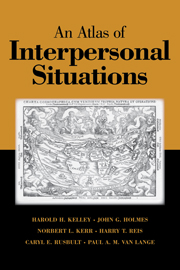Book contents
- Frontmatter
- Contents
- Preface
- PART ONE INTRODUCTION AND THEORY
- PART TWO THE SITUATIONS
- Single-Component Patterns
- Entry #1 Independence: We Go Our Separate Ways
- Entry #2 Mutual Partner Control: I Scratch Your Back, You Scratch Mine
- Entry #3 Corresponding Mutual Joint Control: Getting in Sync
- Entry #4 Conflicting Mutual Joint Control: Match or Mismatch
- Two- and Three-Component Patterns
- Time-Extended Patterns
- Incomplete Information Situations
- N-Person Situations
- Movement from One Situation to Another
- PART THREE EPILOGUE
- References
- Author Index
- Subject Index
Entry #1 - Independence: We Go Our Separate Ways
Published online by Cambridge University Press: 21 October 2009
- Frontmatter
- Contents
- Preface
- PART ONE INTRODUCTION AND THEORY
- PART TWO THE SITUATIONS
- Single-Component Patterns
- Entry #1 Independence: We Go Our Separate Ways
- Entry #2 Mutual Partner Control: I Scratch Your Back, You Scratch Mine
- Entry #3 Corresponding Mutual Joint Control: Getting in Sync
- Entry #4 Conflicting Mutual Joint Control: Match or Mismatch
- Two- and Three-Component Patterns
- Time-Extended Patterns
- Incomplete Information Situations
- N-Person Situations
- Movement from One Situation to Another
- PART THREE EPILOGUE
- References
- Author Index
- Subject Index
Summary
Examples
Situations characterized by mutual independence are those in which neither individual has preferences or aversions regarding the partner's possible behaviors. For example, two students share a large apartment in which each one has a separate room for sleeping and studying. When they retire to their separate rooms, each may behave as he or she wishes without affecting the other's outcomes or being affected by what the other happens to do. Similarly, estranged partners who “go their own way” and are indifferent to one another's actions are mutually independent. Neither person's actions have any impact, for better or for worse, on the well-being of the other. If neither partner in a close relationship derives any benefits or costs from the other's reading habits, then the partners' choices of reading material illustrate mutual independence. Each partner reads what he or she wishes to read, with no implications for the partner's outcomes. (Of course, research on “social facilitation” [Zajonc & Sales, 1966] suggests that exceptions may occur when the partners' mere presence in the same room affects each other's enjoyment and effort.
Conceptual Description
The requirement for the situation of mutual independence is that each person's outcomes are affected only by that person's actions and not by what the partner does nor by what the two do as a pair. Because each person is affected by his or her actions, we may say that each person's outcomes are determined by “actor control.”
- Type
- Chapter
- Information
- An Atlas of Interpersonal Situations , pp. 129 - 141Publisher: Cambridge University PressPrint publication year: 2003



